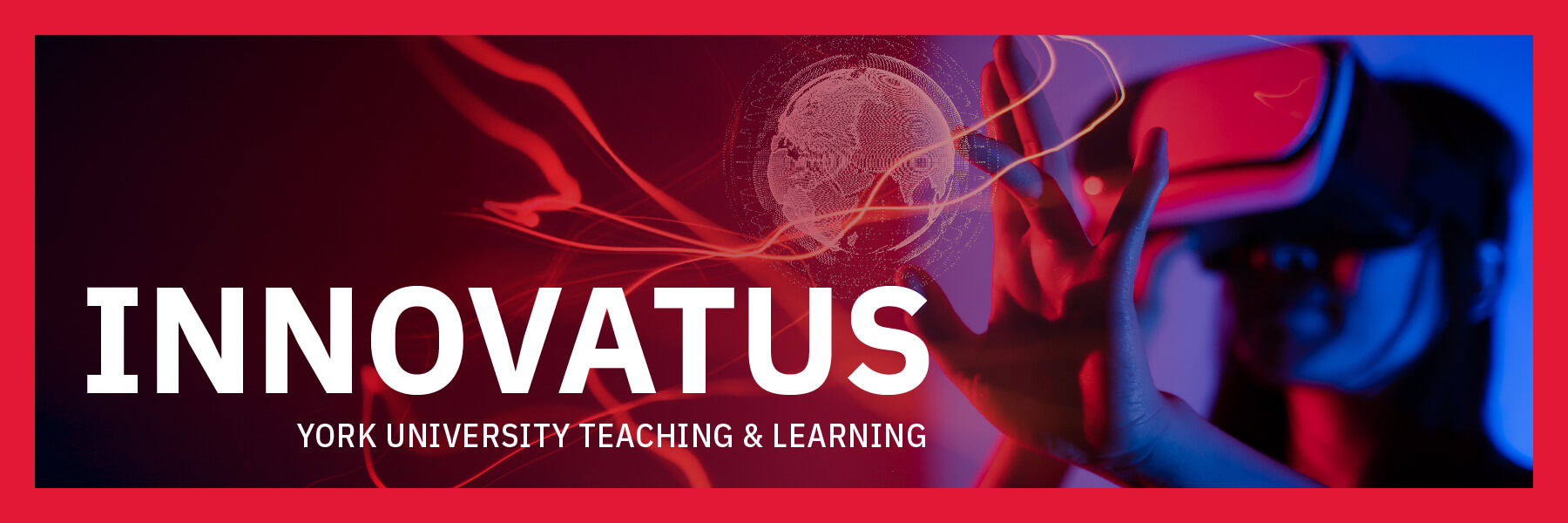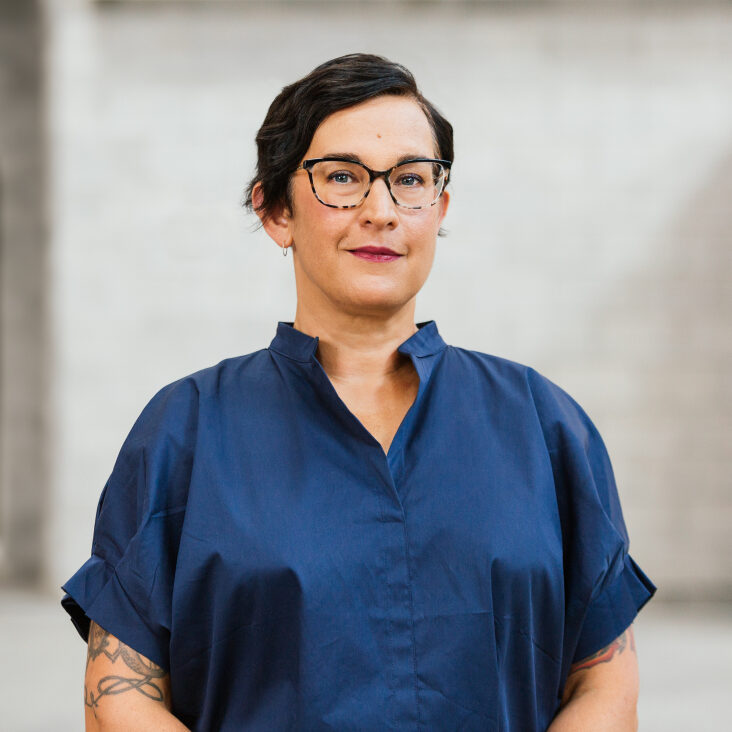
Welcome to the November 2024 edition of Innovatus, a special issue of YFile devoted to teaching and learning at York University. This issue highlights the creative ways York U faculty and staff are educating students about and experimenting with new artificial intelligence (AI) tools, helping to position the University as a leader in the rapidly advancing field.
Innovatus is produced by the Office of the Vice-Provost, Teaching & Learning in partnership with the Communications & Public Affairs Division.

More and more, generative artificial intelligence (GenAI) appears as an inevitability in all kinds of workplaces, including universities. Students and faculty members alike are experimenting with GenAI, and they are working and learning in an environment that is increasingly shaped by this rapidly evolving technology. AI chatbots are likely the fastest-adopted technology in recent history, and they have the potential to radically transform everything we do, including teaching and learning, in much the same way that the internet did not that long ago. A poll conducted in May 2024 shows dramatically increased adoption rates of AI in education, higher than other sectors. At the time the poll was conducted, 49 per cent of educators and 49 per cent of students said they were using the GenAI chatbot ChatGPT at least weekly – and some studies, including a recent survey by the Digital Education Council, put these rates of use even higher.
At the same time, as a newly emergent technology, GenAI poses many unfolding ethical and practical challenges. As we work through these challenges in the area of teaching and learning, we recognize that GenAI may at times be in tension with our existing values at York University, while at other times it may serve to further them. My view is that there is no better place than a university to explore and examine these ethical dilemmas and tensions. In the face of all this change, universities are uniquely positioned to provide an opening for the kind of dialogue we need to approach a transformative new technology with curiosity and critical engagement.
York is committed to supporting our community’s meaningful and intentional engagement with GenAI. To support this, I am thrilled to announce the launch of AI@York, an online resource for thinking and learning together about how GenAI can be integrated into academic life at York. The AI@York website, which launched earlier this week, is designed to reflect York’s core values, mission and strategic vision, while recognizing the profound impact of AI on our diverse community. It provides a wealth of resources rooted in our commitments to equity, sustainability and academic excellence. It links to a web page dedicated to GenAI in research and innovation; University Information Technology resources for using Microsoft Copilot and York’s own platform, AURA, the two AI tools endorsed by the University; as well as a separate website that explores GenAI in teaching and learning.
The GenAI in Teaching and Learning website outlines the key values that underpin our approach at York – transparency, AI literacy, choice, academic integrity and alignment with core values – with practical advice about how to put these values into action in your own teaching and learning.
For those new to the technology, the “GenAI 101” section of the website provides an in-depth introduction to GenAI, covering the basics of how it works, its capabilities and its limitations. This section also offers advice on how to start using GenAI tools effectively and responsibly, with links to resources for effective prompting, co-creating with GenAI and understanding GenAI’s limitations.
The website also includes a robust section dedicated to faculty support. Whether you are looking to incorporate GenAI into your teaching or need guidance on adapting assessment strategies, this section provides valuable insights and resources. It also emphasizes the importance of supporting students in developing their GenAI literacy and offers practical suggestions for integrating GenAI into the classroom. A self-directed YU Learn module on GenAI will be added to the platform soon for those who are interested in diving deeper into how GenAI can complement their teaching. If you are interested in connecting with others who are exploring GenAI in teaching and learning, we invite you to visit the Teaching Commons to register for the next iteration of their asynchronous course “AI and Education,” which will begin in March. The Teaching Commons also hosts a community of practice for educators at York who share an interest in GenAI pedagogies. You can join the community of practice here.
A separate section for students provides tailored resources on how to use GenAI to enhance the learning experience. This section includes information on navigating academic integrity, developing GenAI literacy, and utilizing AI tools for accessibility and support. It encourages students to engage critically with GenAI and to use it as a tool for personal and academic growth.
The ethical implications of GenAI are explored on an additional page, which addresses key ethical questions and provides important considerations for members of the York community as they evaluate how AI aligns with both York’s established values and their own. It provides an overview of the potential risks and limitations of GenAI, encouraging our community to engage in informed and thoughtful discussions about the responsible use of AI technology.
Finally, a section for graduate studies addresses specific guidelines for graduate students and their supervisors on the use of GenAI in graduate student research, with links to emerging guidance from Canadian federal research agencies and the Ontario Council on Graduate Studies.
We are pleased to be hosting a series of events over the next several months to further dialogue and encourage engagement around GenAI. The first event will be a teaching showcase, to be held in January, 2025, featuring colleagues from across the University who are incorporating GenAI into their teaching in innovative ways. Later in the term, we have planned an Assessment in the Time of AI Hack-a-thon – a session for faculty members to come together with their course outlines and assessment ideas to share creative ideas and work together to address or respond to the presence of GenAI in their course and assessment design.
Click here to be placed on a mailing list for details about these and other upcoming events.
I hope you will take some time to explore this new resource and to attend some of our events to reflect on how AI is shaping your experience at York, and its possibilities and challenges for teaching and learning at the University.
Best wishes,
Chloë Brushwood Rose
Vice-Provost Teaching & Learning
Faculty, course directors and staff are invited to share their experiences in teaching, learning, internationalization and the student experience through the Innovatus story form.
In this issue:
York University-developed AI tool simplifies class management
University Information Technology has soft-launched a new classroom management tool, the AL Course Assistant, that is reducing the administrative burden on teachers, freeing them up to focus on higher impact tasks.
Teaching Commons assists with AI adoption in the classroom
Robin Sutherland-Harris, an educational developer at York University’s Teaching Commons, is helping course instructors integrate artificial intelligence into their classrooms.
Embracing AI in education: transforming learning at Lassonde
The Lassonde School of Engineering’s Educational Innovation Studio is collaborating with York University faculty members and other educational partners to explore how artificial intelligence can redefine learning.
New Libraries resources help students navigate AI with integrity
As artificial intelligence redefines what’s possible in higher education, York U librarians Ted Belke and Sophie Bury, in partnership with academic integrity specialist Angela Clark, are developing resources to help students responsibly integrate it into their learning.
